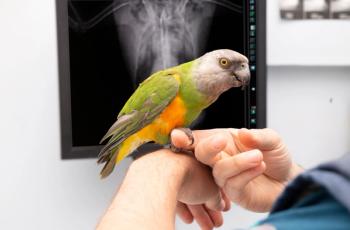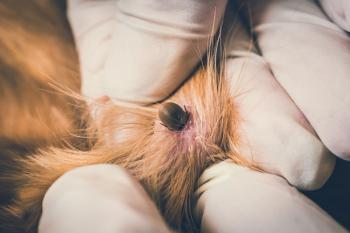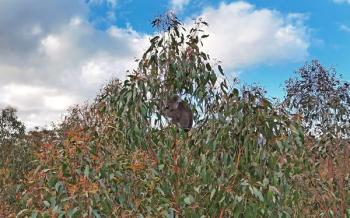
Are you ready for the unexpected?
National Report - He didn't stage a heroic rescue effort or man an impromptu staging area when Hurricane Charlie battered Port Charlotte, Fla., in 2004. He had more pressing duties: picking up the pieces of his shattered home and displaced family.
NATIONAL REPORT — He didn't stage a heroic rescue effort or man an impromptu staging area when Hurricane Charlie battered Port Charlotte, Fla., in 2004. He had more pressing duties: picking up the pieces of his shattered home and displaced family.
"You can't fight the forces of nature," says John Stevens of Animal Medical Center in Port Charlotte, Fla. But practitioners can take precautions to protect their homes and practices. Above, clean-up continues in Mississippi along Highway 90 after Katrina.
"Home and family truly comes first. That's where the survival mode comes in. If you are exposed and totally damaged, then you are not going to be helping anybody else," says Dr. John Stevens, proprietor of Animal Medical Clinic in Port Charlotte. "So you first need to get into that survival mode and get that secured, and then you can go on and help other people."
Operating a veterinary practice during a disaster requires preparation and wherewithal, but Veterinary Medical Assistance Team (VMAT) leaders say practitioners will be rendered useless to the animal population if they fail to take proper care and preparation at home first.
"I don't know if you can be an effective veterinarian if your family is not out of harm's way," says Dr. Jim Hamilton, VMAT 3 founder and commander. "If I truly believe that my calling in life is to be a steward to the animal population, then consistent with that stewardship is my earnest effort to prepare myself and my family such that I can leave them to provide that very necessary service and not feel as though I've left them in harm's way."
Some of the same steps needed to sustain a practice can keep a home secure. First, a generator back-up system can provide emergency electricity, phone service, charge cell phones and provide critical home operations. A one-week fuel reserve for the generator can keep freezers and refrigerators operational until primary power is restored.
Second, stock about one week's supply of fresh water and canned or dried food, just in case.
Preparedness Checklist
Third, have a network of family and friends who might be able to take you in should your community be declared a disaster zone or be uninhabitable for a time. Try to select family or friends who will not be impacted by a far-reaching disaster, such as a large storm or forest fires.
Fourth, understand your insurance policy. Your agent and the companies they work for will be swamped if disaster hits, so you'll want to know what policy coverage entails prior to a disaster. It's a good idea to use a video recorder to catalog a home so you and your insurer can assess the damage properly.
Practice vigilance
When securing a practice, back-up power is critical to keeping practices afloat during compromised infrastructure.
"Generator capability is probably the single biggest thing we can do to prevent major consequences after a storm whether it be small or big, whether it be local or statewide," says Dr. Barry Kellogg, VMAT 1 founder and medical director for the Humane Society of the United States (HSUS) Disaster Services. "There are a couple of really good back-up systems out there that are automatic. They click on to test themselves to make sure they are working. They don't allow back current into the utility lines that endanger people who are working on them. They aren't that unreasonable in terms of cost; just the loss of refrigerate-able drugs alone would almost cover the cost of a generator."
Back-up systems for computer-dependent practices are critical, too. Medical records, inventory/accounting mechanisms and ways to take payment might need to be done manually.
A periodic videotaping of inventory can help protect practice owners from theft, fire, flooding or other unforeseen events as well.
Handouts urging clients to create a disaster plans for their homes are available from the American Veterinary Medical Association, HSUS and the American Red Cross. On-hold practice messages, a countertop placard or posters can initiate clients' thinking about being prepared and keep them apprised of community pet shelters should evacuees not be able to take their pets along to human shelters.
"The veterinarians role is to be the conscience of the client, to simply make sure that that discussion and thought process is kept in the forefront of pet owners' minds," says Hamilton, proprietor of Southern Pines Equine Associates.
But perhaps the most useful safety net resides in the good will of the veterinary community itself.
"I'm an advocate of adopting a sister practice outside your immediate area. Practices can serve as mutual back-ups for each other in providing alternate sites for patient visits as well as storage and delivery," Kellogg says. "That's a very simple step you can take to mitigate some of the major procedural problems that might come up to bat."
Moreover, it might be beneficial to talk with other veterinarians in immediate areas to coordinate disaster protocols and support networks.
"The veterinary community is small enough and unique enough in terms of its operations and characteristics that there is everything to be gained and nothing to be lost from veterinarians figuring out in advance how they could and should help each other during that post-disaster period," Hamilton says. "If veterinarians want to have the greatest impact on their own survivability as well as the health and welfare of the animal community that they are charged with caring for, then they must be be proactive and develop a plan to troubleshoot a community."
Plans should include where to meet, how to communicate and operational responsibilities for each participating veterinarian or practice. It's important, too, to have an emergency call list for the staff at each practice so doctors can determine at what level they might be able to operate.
"The greatest challenge is getting a community to realize that their greatest strength is themselves, cooperation and pro-active planning rather than assuming that there is this mythical, super-hero sort of agency that is going to come flying in on a carpet and make everything OK," Hamilton says.
Getting ready for an emergency can be a daunting, even grueling, but it's crucial for even compromised survival should unexpected tragedy occur.
"You learn who you are and what you stand for when you go through a hurricane like that," Stevens says. "You can't fight the forces of nature. Nobody is that big."
Newsletter
From exam room tips to practice management insights, get trusted veterinary news delivered straight to your inbox—subscribe to dvm360.




